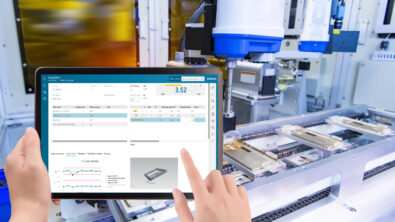Streamline the quality planning process with quality project management tools

Quality project management is the answer to several questions your quality team must answer on an ongoing basis.
How do you ensure that each step in the quality planning process is completed in a timely manner? How do you modify the schedule of quality tasks to accommodate unanticipated needs? How do you improve collaboration on quality programs across design, engineering, manufacturing and quality departments? How do you keep management informed about the status of quality efforts?
Since quality project management capabilities are critical for your product and process development cycles, it seems worthwhile to take a closer look to see how you can leverage it for efficient, successful project implementation. So … let’s take a look!
The need for quality project management
Quality project management helps manufacturers fulfill a critical business goal: to deliver products on time with the right quality. To achieve this goal, you need to track and trace all created deliverables in the quality plan. A systematic approach includes the creation of a schedule and a prompt modifications to address unanticipated quality issues as they arise.
While the goal is simple, it has not always been easy to achieve. In the past, many manufacturing enterprises experienced an adversarial relationship between time and quality management. A considerable amount of time was required to achieve desired product quality consistently and expediting the quality planning process to meet a demanding delivery schedule often raised the likelihood of adverse quality events, the amount of rework required, and the scrap rate.
These difficulties are not alleviated when quality project management amounts to paper-based or simple spreadsheet checklists. Efficient, comprehensive quality project management requires two key capabilities: a software system tailored to the methodology and open channels of communication between the quality department and other manufacturing and enterprise functions.
The functionality of quality project management software
Quality project management software offers an enterprise-wide solution for quality-related deliverables, whether they originated with the quality department or any other domain. This software provides tools to initiate and monitor the progress of these deliverables and to facilitate the completion of required quality milestones.
Quality project management may be handled by a project management module within product lifecycle management (PLM) and/or in a fully dedicated QMS software. In this configuration, the software enables the management of engineering, manufacturing and quality planning activities in one project management tool.
Instead of static checklists, quality project management software provides interactive checklists that are associated with each deliverable. The checklist follows common industry standards like advanced product quality planning (APQP). The checklists include a set of questions that the responsible user must answer. It also allows for comments and attached evidence verifying proper implementation of each action.
Deviations from the initial plan inevitably arise. A due date escalation management feature enables the project manager to modify the schedule as needed while ensuring timely completion of quality milestones. The software also applies a rule set to rate the status of checklist completion that is visible to the quality team. If the status is negatively rated, the responsible project manager is able to assign quality actions that respond to the deviation.
The project team is also able to monitor deliverables, such as failure modes and effects analysis (FMEA), control plans, problem-solving processes, and audits. Perhaps most helpful to efficiency and ease of use, it includes a visual dashboard with a timeline view of the project. All important information is accessible, and the project manager has a quick overview of all activities immediately available.
A powerful set of tools to efficiently meet your goals
Knowing whether a project is on track and follows the key quality standards, receiving alerts when deviations occur, and having the capability to respond to those deviations, the quality project manager and quality team possess a powerful set of tools to efficiently meet the goals of delivering the product on time and in the right quality. A robust quality management system benefits the quality team with:
- Clear visibility into customer deadlines
- Improved collaboration and visibility across domains
- Centrally coordinated internal and external deliverables
Siemens has designed our Teamcenter Quality and Opcenter Quality systems to support a holistic quality program with full-featured quality project management capabilities. As a result, our customers experience extensive transparency for all deliverables and documents and enjoy high confidence that quality requirements are met. Our quality management systems are part of the Siemens Xcelerator portfolio of software and services. We encourage you to explore our QMS software today!
Would you like to learn more about quality best practices? Join our webinar on June 30th and discover how optimize control and inspection processes leveraging comprehensive quality planning. Control and inspection planning contains the process steps and activities to handle critical elements during manufacturing processes. This is where potential risks, while not completely mitigated, can be controlled systematically to identify defective parts. In this webinar, our experts will focus on the creation of a control plan taking the process, as well as the design-driven characteristics, into account. The automated identification of characteristics from the design enables continuous processes to improve quality assurance.


